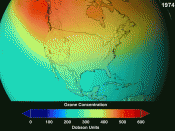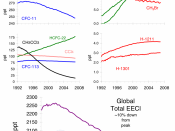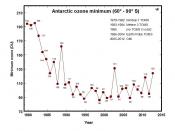For millions of years ozone has been protecting the earth by absorbing ultraviolet or bad radiation from the sun. This shield protecting mankind has recently suffered the effects of industrialized society. This ozone shield is dissipating and the cause is primarily man-made chemicals. If enough of these man - made chemicals are released, the ozone layer would be weakened to such an extent that it does not filter out the sun's invisible and dangerous ultraviolet rays. This would drastically alter society and the environment. Ozone depletion has been described as potential catastrophe.. The three main areas affected by a depleted ozone layer are agriculture, wildlife, and the environment. A depleted ozone layer has a potentially devastating effect on humanity and its surroundings.
Mankind relies heavily on agriculture for food. Ozone depletion could have a devastating impact on agriculture. In general, plants are sensitive when confronted with ultraviolet increases. One agricultural scientist remarked, soybeans, tomatoes, tobacco, potatoes, corn, beans, and wheat are all especially sensitive to UV light.
Since most of the mentioned crops are considered cash crops, less production of crops could mean economic disaster. Plants have been known to adapt to dangerous changes in its surroundings, but UV radiation can also mutate the genes of plants which are the fundamental building blocks of all life. Agriculturally, a depletion in the ozone layer could lead to economic disaster for many.
A depleted ozone layer also effects wildlife in the same way. Marine life is currently the most affected by increases in UV light associated with ozone depletion. There has been speculation that this UV could cause a population collapse in the marine food chain.
Moreover, in support of devastating impact on the crops and animals, a diminished ozone layer has been associated with environmental damage and concern. The potential effect...



Oh
i agree it is too shallow, need further enhancement.
2 out of 2 people found this comment useful.